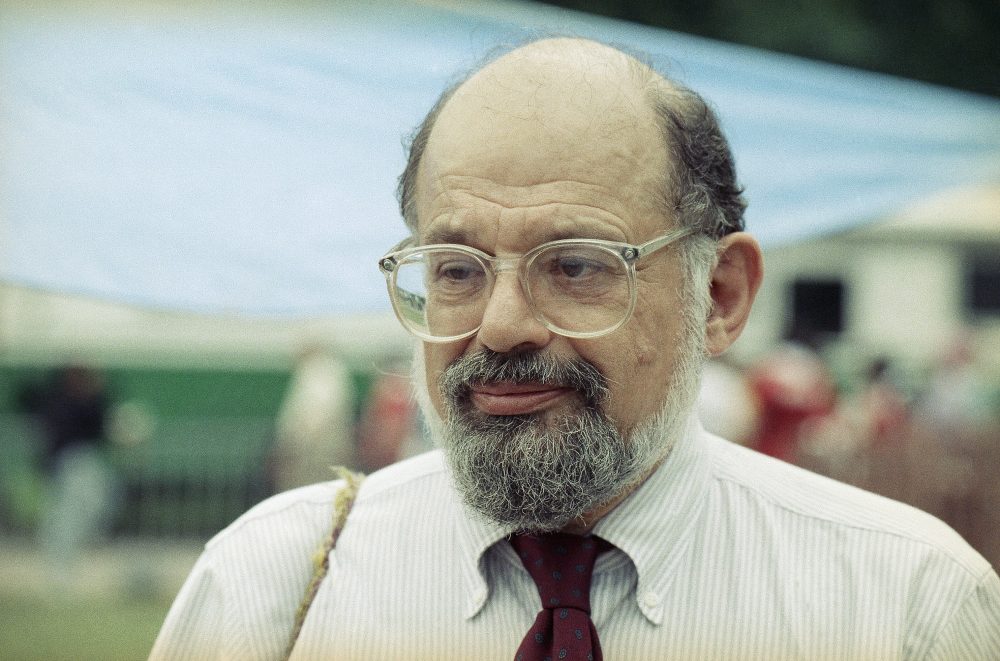Advertisement
Literary And Musical Circles Mix Things Up For Allen Ginsberg In A New Late-Night Series

Get ready to Howl.
Emmanuel Music has a new plan for the weekend: Let’s stay up late listening to poetry and music. Kicking off a new series on Saturday, Sept. 23, poets, composers and musicians will gather for a literary/musical soirée, centered around Allen Ginsberg's supercharged diatribe "Howl."
This iteration of Late Night at Emmanuel (well, late for poetry and classical music) includes composers Lee Hyla, John Harbison, Elena Ruehr and Andy Vores. The poets, besides Ginsberg, include The ARTery’s distinguished contributor Lloyd Schwartz and Jessica Fisher. The Arneis Quartet, along with baritone David Kravitz, mezzo Lynn Torgove, pianist Donald Berman and others will bring the settings to life.
It’s a generous gathering of literary and musical stalwarts. Two performances (at 8 and 10 p.m.), with drinks and chats with the artists in a cabaret setting, will offer an alternative to bar-hopping in the Back Bay.
“Howl” was set for string quartet and narrator in 1994 by the late Hyla, and premiered that year at Carnegie Hall, with Ginsberg as the narrator along with the Kronos Quartet. It’s a scream-out-loud rant, and the energy generated by both quartet and narrator hardly lets up for its 15 or so minutes.
David Kravitz narrates for this performance, accompanied by Arneis. They will perform selected parts of the poem, coupling it with two different settings (by Vores and Ruehr) of another poem by Ginsberg — "A Supermarket in California."
Kravitz and the Arneis (Heather Braun-Bakken and Rose Drucker on violin; Daniel Doña on viola; Agnes Kim on cello) have been collaborating on a similar concert program for several years now, one that grew out the poetry of another American iconoclast, Walt Whitman (who figures prominently as a character in “Supermarket”).
“The whole idea for that program was to connect Whitman and Ginsberg,” Kravitz says of his collaboration with Arneis. “It sort of evolved. I found the score of ‘Howl’ back in the day, not having any idea when I would get to do it. And since ‘Supermarket’ fantasizes this meeting between Whitman and Ginsberg, but it was never set to music, I had the idea of writing some for it."
“Andy and Elena took incredibly different approaches to ‘Supermarket,’ ” Kravitz says. “Andy’s is quite spiky, especially at the beginning. It’s not the most tuneful piece ever written, but it’s curious. Elena’s piece is in a faux Americana style, much more confident. It almost sounds like some American hymn tunes.
“The poem is a really wry commentary on consumerism, but then it takes a weird turn toward the underworld. There’s a lot of humor in it, and both composers try to tease that out in different ways.”
The main difference between “Supermarket” and “Howl,” from Kravitz’s view, is that one gets sung, the other is spoken. “Howl” “is quite exhausting, actually,” he says. “As a narrator you work a lot harder than you do as a singer. You want to be heard, and you do have to talk quite loud, and there’s very little downtime. I have to force myself to do all the things that come more naturally as a singer.”
Narrating skills are at the core of “Schwartzsongs,” three poems by the Pulitzer Prize-winning music critic Schwartz, set by Harbison. This performance is the world premiere. Schwartz himself will read, with pianist Donald Berman accompanying. “Schwartzsongs” is “an effort to reproduce the voice of Lloyd Schwartz, which I have experienced many times,” Harbison writes about the works, in his note to the program. “The particular rhythmic cadence of Lloyd’s delivery defines the musical idiom for these three songs.”
For a sample of his voice, here’s Schwartz reading his short poem “Six Words”:
Another work by Harbison, “The Right to Pleasure,” fills out the literary evening.
Written for for string quintet (bass Randall Zigler joining Arneis) and singer, mezzo Lynn Torgove realizes the four poems, taken from Jessica Fisher’s volume “Frail-Craft.” Harbison notes that “what the composer wants from every poet is to find a way to a kind of piece they hadn’t written before.” Torgove, who is the dedicatee for one of the songs, calls Harbison’s settings “fierce, shocking and sensual.”
Late Night at Emmanuel consists of two performances on Saturday, Sept. 23, at 8 and 10 p.m. John Harbison, Andy Vores, Elena Ruehr and Lloyd Schwartz will be on hand between performances and afterward for an informal discussion of the collaborations.


